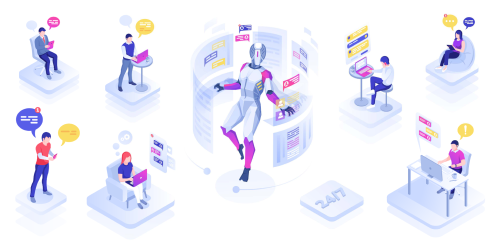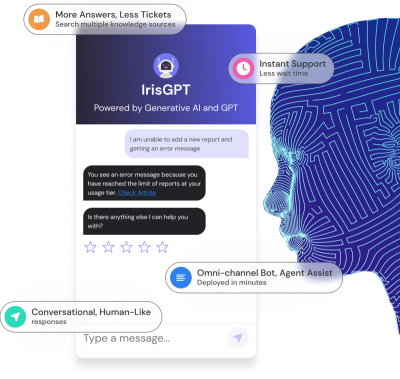ChatGPT for Customer Service: Use Cases, Pros And How To Implement
Introduction
ChatGPT, powered by OpenAI’s renowned language model, has emerged as a game-changer in the realm of customer service. This section provides an insightful introduction to ChatGPT in customer service, highlighting its significance, benefits, and the purpose of this article to improve customer service. ChatGPT brings numerous advantages to improve customer support service, such as providing instant and accurate support, reducing customer wait times, and enhancing overall customer satisfaction. By integrating this AI-powered tool, businesses can enhance their customer service team capabilities, offering 24/7 availability that traditional customer service teams cannot, thereby improving customer service representative quality while reducing operational costs.
What is ChatGPT?
ChatGPT is an advanced language model, designed to generate human-like, instant responses in conversation. It has the remarkable ability to generate human-like responses, engaging in conversation with humans by generating responses that mimic human interaction. This AI-powered technology can understand and process natural language to provide contextually relevant and coherent replies in natural conversations in multiple languages, making it an invaluable tool for various applications such as virtual assistants, human customer service agents in support, and content generation.
Can ChatGPT be used for customer service?
ChatGPT has increasingly become a valuable tool in the realm of customer service, offering significant assistance to clients by addressing complex inquiries related to products and services. This AI-driven technology is adept at understanding and responding to customer queries in real time, providing accurate information and solutions. By leveraging ChatGPT, businesses can enhance their customer support experience, offering immediate responses to frequently asked questions, troubleshooting common issues, and providing detailed instructions and guidance on product usage and service procedures.
One of the key benefits of using ChatGPT in customer service is its availability around the clock. Unlike human agents who require breaks and have working hours, ChatGPT can offer continuous support, ensuring that customer queries are addressed promptly at any time of the day or night. This feature is particularly beneficial for businesses with a global customer base across different time zones.
Furthermore, while ChatGPT significantly reduces the workload on human customer service representatives, it does not eliminate the need for human intervention. Complex issues that require human empathy alone, deep contextual understanding display empathy, or decision-making beyond the AI's training may still need to be escalated to human agents. However, by handling routine inquiries and basic troubleshooting, ChatGPT allows human agents to focus on more complex and sensitive cases, thereby improving overall efficiency and customer satisfaction.
In summary, ChatGPT serves as a powerful tool in customer service, enhancing the support experience through its ability to ensure that customers receive immediate, accurate responses to a wide range of queries. While it complements human customer service agents rather than replacing them entirely, its integration into customer service strategies can lead to significant improvements in efficiency, availability, and customer satisfaction.
Overview of ChatGPT in customer service
ChatGPT represents a breakthrough in natural language processing (NLP) technology, capable of understanding and generating human-like text responses. In the context of the customer service industry, ChatGPT serves as a virtual assistant, engaging with customers in real-time, answering inquiries, resolving customer complaints, and providing assistance across various channels. Its ability to comprehend context, tone, and intent makes it a valuable asset for businesses looking to enhance their customer support operations. ChatGPT's versatility and scalability enable it to handle a wide range of tasks, from responding to frequently asked questions (FAQs) to offering personalized recommendations and dynamic content generation.
Importance of leveraging ChatGPT for customer service
The importance of leveraging ChatGPT for customer service cannot be overstated, particularly in today's fast-paced and digitally-driven marketplace. Businesses face growing pressure to deliver exceptional customer experiences while managing increasing volumes of inquiries across multiple channels. ChatGPT offers a solution to these challenges to improve customer service by providing instantaneous, accurate, and personalized responses to all customer requests and inquiries, thereby improving response times, enhancing satisfaction levels, and driving customer loyalty. By leveraging ChatGPT, businesses can streamline customer support teams' operations, reduce workload for human agents, and deliver consistent, high-quality support experiences around the clock.
Purpose and structure of the article
The purpose of this article is to provide a comprehensive exploration of the use cases, benefits, and best practices associated with leveraging ChatGPT for customer service. Structured as a comprehensive guide, this article will delve into various aspects of ChatGPT implementation, including its capabilities, pros, implementation strategies, challenges, and real-world examples. By providing actionable insights and practical guidance, this article aims to equip businesses with the knowledge base and tools necessary to harness the full potential of ChatGPT in their customer support endeavors. Whether you're a seasoned professional or new to the concept of AI-driven customer service, this article offers valuable insights and strategies to help you succeed.
Utilizing ChatGPT in Customer Service: Potential Use Cases and Benefits
ChatGPT, a customer service chatbot powered by OpenAI's advanced language model, offers immense potential to revolutionize customer service. By integrating ChatGPT into customer support systems, businesses can reap the multiple benefits of quick response time, 24/7 availability, personalized assistance, and reduced operational costs, ultimately leading to increased customer satisfaction and a competitive edge in the market.
1. Quick response time
Using ChatGPT for customer support in customer service chatbots, businesses can provide instant responses to customer service queries, eliminating wait times for customer surveys' detailed answers and streamlining the support process. Faster responses address customer issues promptly and enhance the overall customer experience, leading to higher satisfaction and great customer service.
2. 24/7 availability
Integrating ChatGPT into support systems allows businesses to offer round-the-clock assistance to their customers, irrespective of time zones through customer service chatbots. As a result, customers can get help whenever needed, and businesses can cater and offer services to a global clientele without additional staffing during off-peak and normal business hours.
3. Personalized assistance
ChatGPT's advanced language model enables highly personalized customer interactions, understanding their unique needs and preferences in customer service chatbots. This tailored support helps resolve issues effectively and creates a positive impression, fostering stronger customer relationships and building brand loyalty.
4. Reduced operational costs
Implementing ChatGPT for customer support can significantly reduce operational costs by minimizing reliance on human customer support agents. A scalable and automated solution, ChatGPT enables businesses to adjust their customer support capacity without the need for expensive expansions in personnel and infrastructure.
5. Increased Customer Satisfaction and Enhanced Customer Experience
By user interactions and delivering faster responses, personalized assistance, and uninterrupted support, ChatGPT customer service contributes to an improved customer experience. Satisfied customers are more likely to return and recommend the business to others, increasing brand awareness and growth.
6. Agent Assist for Customer Service Agents
ChatGPT can be a valuable tool and a significant leap for customer service teams, providing real-time assistance and information. By augmenting the capabilities of customer service teams, ChatGPT enables them to handle complex customer inquiries and queries more efficiently, further improving the quality of their customer service interactions and customer satisfaction.
7. Case summarization
With its advanced language understanding, ChatGPT can assist customer service representatives in summarizing case details, helping both customers and customer service support team members grasp the context of an issue and answer questions quickly. This streamlined access to case information facilitates faster resolution times and more effective communication between parties.
8. Sentiment detection
ChatGPT's ability to detect and analyze sentiment in customer communications can help businesses understand their customers' emotions and preferences. By using customer sentiment and identifying positive or negative sentiments in customer conversations, support agents can then generate responses and adapt their responses accordingly, leading to more empathetic and effective communication that results in satisfied customers and stronger brand loyalty.
Surpassing ChatGPT's Customer Service Constraints
ChatGPT offers many benefits for customer service, but it has certain limitations, too, such as hallucinations, insufficient integration into ticketing systems for seamless, human interaction, a human agent during call handoff, poor accuracy in outlier scenarios, lack of multilingual support, etc. By recognizing and addressing these challenges, businesses can ensure the smooth integration of ChatGPT into their customer service systems, thereby enhancing user experience, reducing response times, and optimizing human resources. Below are two possible ways to overcome these challenges.

Reinforcement Learning from Human Feedback (RLHF)
Reinforcement Learning from Human Feedback (RLHF) is an advanced form of machine learning that incorporates human feedback to guide its learning processes. The algorithm can fine-tune itself by analyzing human interactions and responses, increasing its accuracy, efficiency, and adaptability. RLHF is thus valuable in applications where human expertise is necessary to improve the model's decision-making capabilities.
Combining Human Expertise with Algorithmic Learning
RLHF leverages the power of human expertise and algorithmic learning, allowing the model to capitalize on the strengths of both methods. The human feedback helps the system recognize and learn subtle nuances that may be difficult for the algorithm to discern, leading to improved decision-making and better performance in various applications.
Accelerated Learning and Adaptation
Reinforcement Learning from Human Feedback enables the AI and Natural Language Processing system to learn and adapt more quickly, as it constantly incorporates and adjusts large language models to human feedback. This constant feedback loop ensures the large language model stays up-to-date and relevant, even in dynamic environments where the requirements change rapidly.
Applications Across Diverse Domains
RLHF has been successfully applied in various domains, from robotics and autonomous vehicles to healthcare and finance. The common thread in these applications is the necessity for human expertise training data, and judgment, which the RLHF model leverages to improve its decision-making capabilities and provide more accurate and contextually appropriate solutions.
Translate inquiries and responses
Translating inquiries' own data and responses is crucial to communication and understanding today's diverse and globalized world. This skill lets you interpret information in different languages, making communicating and collaborating easier. In addition, it helps break down language barriers and fosters better relationships between individuals, business support teams, and organizations.
Integrating ChatGPT Into Your Customer Service Team's Support System (Zendesk ChatGPT Integration, etc.)

The integration of ChatGPT into your customer support system, be it Zendesk, Salesforce, Intercom, Jira, or others, can revolutionize customer support team interaction and help launch customer service chatbots. It enables instant response to customer inquiries, reduces your customer support team's workload, and eliminates customer wait time. Check out how IrisAgent powers Zendesk ChatGPT integration | Salesforce ChatGPT integration | Intercom ChatGPT integration | Freshdesk ChatGPT integration | Jira ChatGPT integration.
This AI-powered system for customer service chatbots can understand human-like responses, analyze customer sentiment based on service queries, offer solutions, and even carry out task-oriented conversations using Natural Language Understanding. A significant boost to customer satisfaction!
Providing exceptional customer support is vital for any business aiming to thrive in today's competitive landscape. As AI technology advances, integrating intelligent solutions like ChatGPT into your customer support system can significantly enhance your ability to meet customer needs effectively. Here are some steps to help you integrate ChatGPT seamlessly into your customer support operations:
Define Your Objectives: Clearly outline your goals and objectives for integrating ChatGPT into your customer support system. Identify the areas where you want to leverage AI capabilities, such as automating repetitive tasks, improving response times, or enhancing personalization.
Gather Relevant Data: Collect a comprehensive dataset of past customer interactions to train ChatGPT and make it more effective in handling customer service queries. This data should include common inquiries, preferred responses, and relevant information specific to your business domain. The more diverse and representative your dataset, the better ChatGPT will perform.
Preprocess and Prepare the Data: Clean and preprocess the collected data to ensure its quality and suitability for training ChatGPT. Remove sensitive or confidential information while retaining the context for effective response generation. Organize the data into appropriate formats, such as pairs of customer queries and corresponding support agent responses.
Train ChatGPT: Utilize the OpenAI API or deploy your own instance of ChatGPT to train the model on the prepared dataset. Fine-tune the model using techniques like supervised or reinforcement learning, depending on the complexity of your support requirements. Adjust the training parameters, such as learning rate and batch size, to optimize performance.
Implement Integration Channels: Determine how customers will interact with ChatGPT. This can include live chat on your website, messaging apps, or social media platforms. Integrate ChatGPT with these channels to enable seamless customer communication and the AI-powered support system.
Set up Escalation Mechanisms: While ChatGPT can handle a wide range of queries, there may be instances where it requires human intervention. Establish an escalation mechanism that allows seamless handoff from ChatGPT to human support agents when complex or critical issues arise. Define clear criteria for when to escalate, ensuring a smooth transition without causing frustration for customers.
Monitor and Evaluate Performance: Regularly monitor ChatGPT's performance and gather feedback from customers and customer service agents. Continuously evaluate its effectiveness in understanding and addressing customer queries. Use metrics like response accuracy, customer satisfaction ratings, and resolution times to gauge ChatGPT's performance and identify areas for improvement.
Iterative Refinement: Leverage the insights gained from monitoring and evaluation to refine and improve ChatGPT using Natural Language Processing. Incorporate customer feedback, update training datasets, and retrain the model periodically to ensure it stays updated with evolving customer needs and business requirements.
Provide Customer Service Agent Training and Support: Equip your customer service reps with the necessary training and resources to work effectively with ChatGPT. Educate them on the AI capabilities, its limitations, and best practices for collaboration. Foster a culture that embraces AI as a tool to augment their work, rather than replacing their expertise.
Regular Maintenance and Updates: Maintain and update your ChatGPT integration regularly to address any software updates, security vulnerabilities, or emerging customer support trends. Stay informed about advancements in AI technology and explore new features or improvements that can further enhance your customer support system.
Integrating ChatGPT into your customer support system has the potential to revolutionize your customer support team's productivity and service operations. By following these steps and continuously refining your implementation, you can leverage AI capabilities to deliver prompt, personalized, and efficient customer support, ultimately driving customer satisfaction and loyalty.
Enhancing Self-Service through AI Chatbots such as IrisAgent
Artificial intelligence chatbots, particularly IrisAgent, contribute significantly to streamlining customer self-service experiences. These AI-powered bots can handle many routine tasks and inquiries, provide instant support round-the-clock, and guide users through complex processes. By leveraging these advanced chatbots, businesses can seamlessly cater to their customer's needs while enhancing client satisfaction and reducing service costs.
Sign up today for IrisAgent and supercharge your customer support operations.
FAQs
What is ChatGPT and how does it work in customer service?
ChatGPT is a state-of-the-art language model developed by OpenAI that utilizes deep learning algorithms to generate human-like text responses. In customer service, ChatGPT acts as a human support agent or virtual assistant, engaging with customers in real-time, answering inquiries, resolving issues, and providing assistance across various communication channels. It comprehends the context, tone, and intent of the a customer service representative's query or queries to deliver accurate and personalized responses.
What are some common use cases of ChatGPT for customer service?
Some common use cases of ChatGPT for customer service include:
Automated responses to frequently asked questions (FAQs)
Personalized product recommendations and assistance
Language translation and multilingual support
Sentiment analysis and customer feedback analysis
Dynamic content generation for marketing and engagement purposes
What are the benefits of using ChatGPT for customer service?
Using ChatGPT in customer service offers several benefits, including:
Enhanced efficiency and scalability by automating repetitive tasks
Improved customer satisfaction and engagement through personalized interactions
Cost savings and resource optimization by reducing the workload for human agents
Consistency and accuracy in responses, ensuring a high-quality support experience
Ability to handle high volume and peak traffic periods without delays or downtime
How can customer service leaders implement ChatGPT for customer service?
Implementing ChatGPT in customer service involves several steps:
Assessing business needs and objectives to determine the appropriate use cases for ChatGPT
Selecting the right ChatGPT model and configuration based on the identified use cases
Integrating ChatGPT with existing customer service platforms and communication channels
Training and fine-tuning ChatGPT for specific use cases to improve accuracy and performance
Monitoring and measuring key performance metrics to evaluate the effectiveness of ChatGPT implementation
Continuously optimizing and refining ChatGPT based on feedback and insights gathered from customer interactions.
What are some challenges to consider when implementing ChatGPT in customer service?
Some challenging technical issues to consider when implementing ChatGPT in customer service include:
Ensuring data privacy and security to protect sensitive customer information
Managing customer expectations and trust regarding AI-driven interactions
Handling complex or sensitive inquiries that may require human intervention
Balancing automation with the human touch to maintain personalized and empathetic support interactions.





